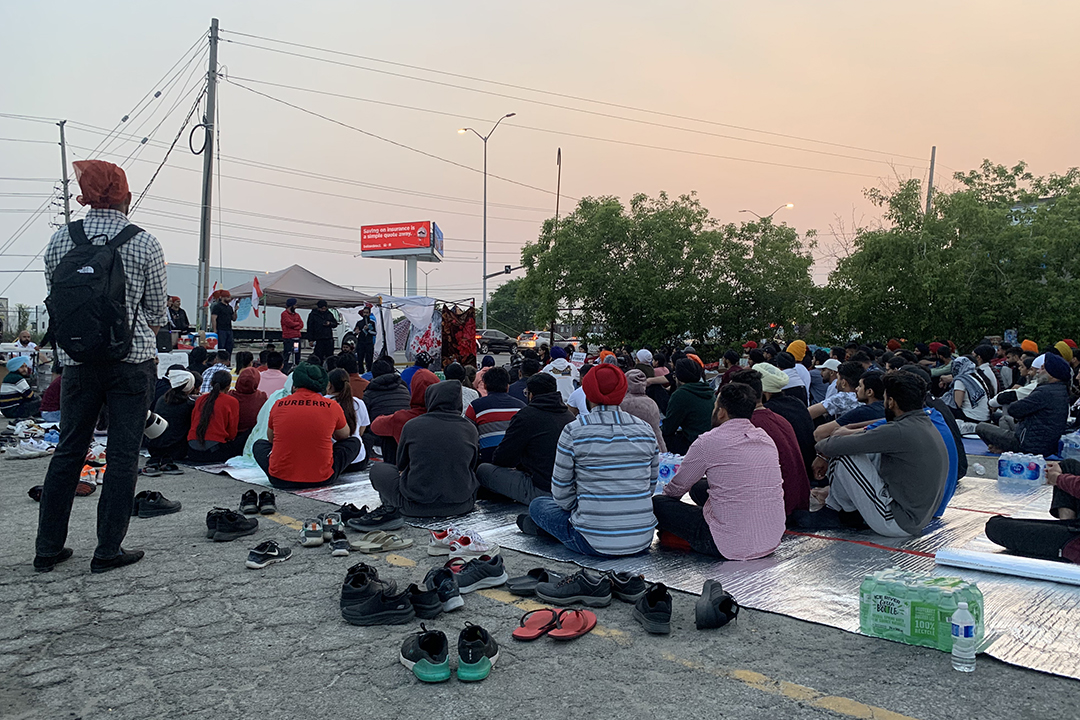The federal government has paused the removal of over 700 international students who possessed fake letters of admission to Canadian post-secondary institutions.
Earlier this year, the Canadian Border Security Agency (CBSA) sent out hundreds of deportation letters to international students from India who fell victim to a fraudulent college admission scam.
As a result, protests have broken out across the GTA, including one in the parking lot of the CBSA’s headquarters, where deportation orders are processed.
In an interview with The Varsity, Raman Brar, a former St. Lawrence College student camping out at the site, explained that the CBSA did not detect her fake admission letter when she arrived on a study permit in 2018 and received a work permit in 2020. It was only when she applied for her permanent residency, after spending years in Canada and $40,000 in tuition that she was sent a letter saying her study permit was fraudulent and she could be deported.
“Why are they only blaming us? Why are they not blaming their immigration system?” Brar said.
Lovepreet Singh, another protestor, explained that immigration agents in his home country took advantage of flaws in the Canadian immigration system to produce fake letters of admission.
He added that many international students were qualified and capable of obtaining legal documentation. Singh told The Varsity, “Why do students need a fake offer letter when they are capable of obtaining the original one?”
The protests included a Sikh call to prayer as well as Punjabi music. Community members brought food, blankets, mattresses, and tarps to the site.
According to one protester, 16 students who were all from Punjab, India lived in the parking lot during the protest, taking only two hours each day to go home.
Activist and poet Rupi Kaur also spoke at the event. As a member of the diaspora, Kaur said it was “her duty” to support newcomers by using her voice and platform.
In an interview with The Varsity, Kaur explained that her father was a refugee, and after seeing what her parents had gone through, she felt empathetic to the international students’ cause.
“Growing up, my dad… had an open door policy for refugees and immigrants,” Kaur said. “Sometimes, as a kid, it was annoying because you don’t understand and you’re like ‘Who are these strangers always living with us? It’s so annoying, Dad!’ But that’s really what taught me to share space with people.”
During a press conference in June, Immigration, Refugees and Citizenship Canada (IRCC) Minister Sean Fraser announced the creation of a task force to investigate individual cases where students received fraudulent acceptance letters.
Fraser said, “The government of Canada’s focus is on identifying those who are responsible for the fraudulent activity and not on penalizing those who may have been affected by fraud.”
According to Fraser’s announcement, students facing deportation orders will be provided with an “eight-week temporary resident permit” that allows them to stay in the country while their cases are under consideration.
The Varsity has not identified any U of T students who received fraudulent admission documents or currently face deportation.
In an email to The Varsity on June 12, a spokesperson from U of T’s Office of the Vice-Provost, Strategic Enrolment Management wrote that “The University of Toronto does not engage with third-party agents to recruit students.”
“There is no way for us to know about individuals who may have received fraudulent admission letters through third-party agents as, by definition, they would not be registered U of T students,” the spokesperson wrote.



No comments to display.